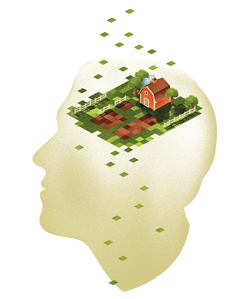Farm living is the life for them
Posted by magazine

(Illustration by Brandan Deason)
Every day millions of Facebook users log onto their computers to plow land, plant and harvest crops, and raise livestock. Most play the farming simulation game Farmville purely for entertainment, but for a group of engineering students at S&T, it was all for a grade — and the chance to learn new approaches to solving complex engineering problems.
Students in Ivan Guardiola’s Introduction to Operations Research course spent a week last semester playing the game. Farmville rewards players for tending to their virtual crops and cattle, but these students were also learning how to make better decisions in business and engineering. Through Guardiola’s challenge, students competed to see who could earn the most money and gain the most experience.
At the start of the game, students developed plans, based on mathematical models, to achieve their goals. But many had to adjust their plans throughout the game as conditions and situations changed.
“It is up to the player to determine how much land to plow, which seeds to plant, how many seeds to plant, and when to harvest the plants,” says Guardiola, an assistant professor of engineering management and systems engineering. “Decisions were completely up to the player.”
Guardiola says the game helps students develop critical thinking and decision-making abilities because it forces them to deal with ambiguous situations.
“In engineering, we use data to make decisions, but that approach has limitations because situations are constantly changing,” he says. “So you have to assess your situation continuously and adjust accordingly.”
Research accolades
Ivan Guardiola’s research paper about his classroom project, “Using a Social Networking Game to Teach Operations Research and Management Science Fundamental Concepts,” was named co-winner of the 2011 Best Young Faculty Paper Award in the Industrial Engineering Division of the American Society for Engineering Education. His co-authors are Susan Murray, professor of engineering management and systems engineering, and Elizabeth Cudney, PhD EMgt’06, assistant professor of engineering management and systems engineering.